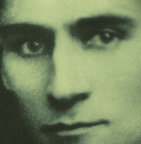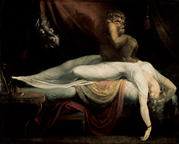- Kafkaesque: characterized
by surreal distortion and a sense of impending danger; "the kafkaesque terror of the endless interrogations".
- The Free Dictionary
-
- Franz
Kafka
 Born: 3 July
1883; Prague, Austria-Hungary Born: 3 July
1883; Prague, Austria-Hungary
Middle class Jewish family, retail clothing business
Classical
education, Altstädter Deutsches Gymnasium - 1893-1901
Friendship
with Max Brod - 1902
Law doctorate
- 1906
Job
w/insurance co., Assicurazioni Generali -
1907
Job w/Worker's Accident Insurance Institute for the Kingdom of
Bohemia - 1908
Starts
diaries - 1910
Interest in
Yiddish theatre - 1911
3 weeks in
Jungborn sanitarium - 1912
Engagement to
Felice Bauer - 1914
Tuberculosis - 1917
Deals
w/domineering father (Hermann) in a letter never sent -
1919
Romance
w/Dora Dymant, moves to Berlin - 1923
Eventually declares himself a socialist
atheist, Spinoza, Darwin and Nietzsche
some of his influences.
Sanitarium,
Kierling - 1924
From his
death bed he makes a request of his executor, Max Brod:
"Everything I leave behind
me ... in the way of diaries, manuscripts, letters (my own and
others'), sketches, and so on, [is] to be burned unread."
Brod does not comply.
Dies:
3 June 1924: Klosterneuburg, Austria; tuberculosis of the larynx.
"The
Judgement" - 1912
Amerika - 1912; pub.1927
" Metamorphosis" - 1912
The Trial - 1912; pub.1925
" In the Penal Colony" - 1914
"A Country Doctor" - 1916
The Castle - 1922 pub. 1926
" A Hunger Artist" - 1922
"Josephene
the Singer" - pub.1924
Diaries (ed. Max Brod) - 1948 & 49
Letters (ed. Max Brod) - 1959
Kafka
appears to have lost his self-confidence early in life, exchanging
for it, as he himself put it, "a boundless sense of guilt." Moods
of loss and failure, and the idea of the insolubility even
of the most ordinary human problems, depressed his youth
and later
inspired his art.
- Philip
Rahv

- I seek out a
good hiding place and keep watch on the entrance of my
house - this time from outside - for whole days and
nights. Call it foolish if you like; it gives me infinite
pleasure and reassures me. At such times it is as if I
were not so much looking at my house as at myself
sleeping, and had the joy of being in a profound slumber
and simultaneously of keeping vigilant guard over myself.
I am privileged, as it were, not only to dream about the
specters of the night in all the helplessness and blind
trust of sleep, but also at the same time to confront
them in actuality with the calm judgement of the fully
awake.
-
"The
Burrow"
trans. Willa & Edwin Muir

|
 Born: 3 July
1883; Prague, Austria-Hungary
Born: 3 July
1883; Prague, Austria-Hungary
